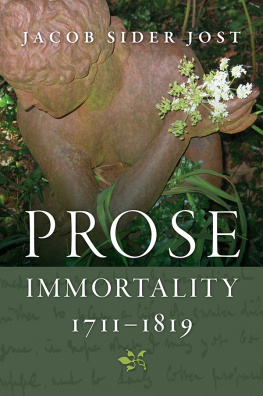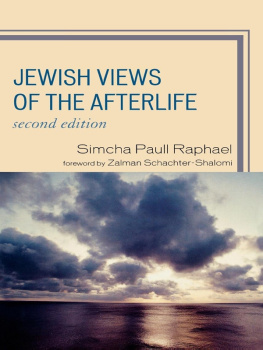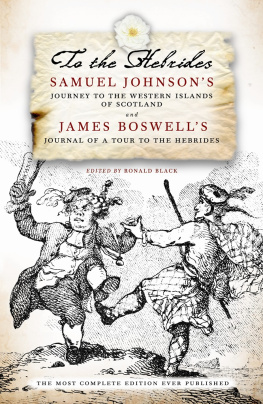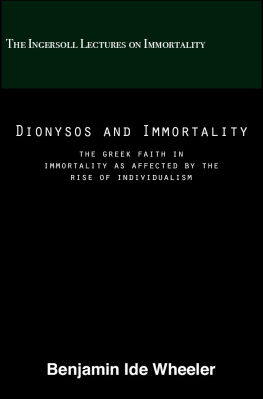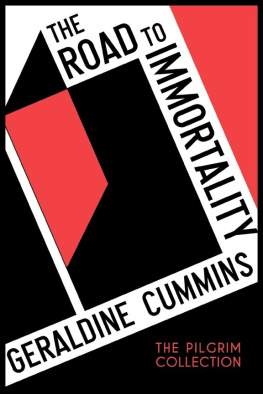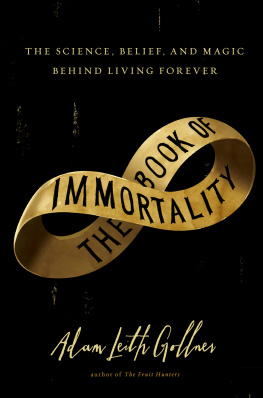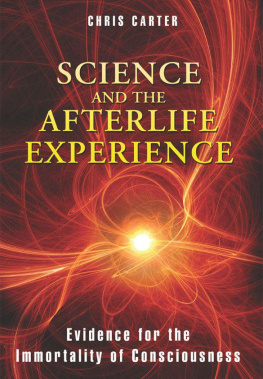Winner of the Walker Cowen Memorial Prize for an outstanding work of scholarship in eighteenth-century studies
PROSE IMMORTALITY,
17111819

Jacob Sider Jost
UNIVERSITY OF VIRGINIA PRESS
Charlottesville & London
University of Virginia Press
2015 by the Rector and Visitors of the University of Virginia
All rights reserved
Printed in the United States of America on acid-free paper
First published 2015
1 3 5 7 9 8 6 4 2
Library of Congress Cataloging-in-Publication Data
Sider Jost, Jacob, 1983 author.
Prose Immortality, 17111819 / Jacob Sider Jost.
pages cm. (Winner of the Walker Cowen Memorial Prize)
Includes bibliographical references and index.
ISBN 978-0-8139-3680-2 (cloth : acid-free paper)
ISBN 978-0-8139-3681-9 (ebook)
1. English prose literature18th centuryHistory and criticism. I. Title.
PR769.J67 2015
828.50809dc23
2014029161
ACKNOWLEDGMENTS
My oldest obligations are to my mentors at Goshen College, John D. Roth and Ervin Beck. At Oxford I was lucky to learn Chaucer from Carolyne Larrington and Shakespeare from Frank Romany, but not before Clare Brant hooked me on the eighteenth century in a four-person tutorial where 50 percent of the students went pro in the field (hi, Natalie!). In the Harvard English department I had an all-star team of advisors in Jim Engell, Leo Damrosch, and Leah Price. I learned an enormous amount from talking with them and reading their comments on my work, and even more from watching them teach, think, and write. To my two gracious and generous mentors beyond the committee, Elaine Scarry and Emma Rothschild: thank you.
Among other professors with open doors and helpful thoughts, I thank Nicholas Watson, James Simpson, and Amanda Claybaugh. Harvard also provided me with a fantastic graduate student community: here my greatest debt is to the eighteenth-century and romanticism colloquium and its redoubtable founding coordinator, Matt Ocheltree; thanks also to Dan Shore, Tom Fehse, Fred van der Wyck, Sarah Wagner-McCoy, Sam Foster, and Nick Donofrio. Luke Leafgren and Lindsay Noll went above and beyond the call of friendship in opening their home to me in my final year at the Society. Make new friends and keep the old: my formative grad school years were enriched throughout by dialogue with Peter Fairfield, John Leigh, Peter Hartman, Laura Yoder, Peter Dula, Mark Metzler-Sawin, Lee Good, and Janneken Smucker. Three cheers also to librarians like Laura Farwell Blake and John Horace Rumpole Overholt.
Finding my way in the wider world of eighteenth-century studies, I came under the influence and patronage of two major figures in the field, Adam Potkay and Stuart Sherman. Both have given me opportunities and support that the footnotes to their works in what follows cannot convey. I am also grateful for the friendship and assistance of Adam Rounce, Tony Lavopa, Rosemary Dixon, Derek Taylor, Robert Demaria, and Billy Flesch, as well as the opportunities provided by the Yale Boswell Projects and Rare Book School.
At the Harvard Society of Fellows, I found new sources of insight in conversation with Gregory Nagy and Noah Feldman among the grownups and Marta Figlerowicz, Martin Hgglund, Timothy Barnes, Eric Nelson, and Jo Guldi among the kids. Thanks also to Diana Morse, Kelly Katz, and Wally Gilbert.
I know how lucky I am to have wonderful colleagues at Dickinson College. Particular thanks go to Siobhan Philips, Carol Ann Johnston, Wendy Moffat, and Tom Reed. Thanks also to the Dickinson College Research and Development Committee. Beyond the limestone, other institutions and organizations that deserve warm thanks for paying the bills while I was reading books include the Mellon Foundation and the American Council of Learned Societies, which generously provided dissertation completion funding; Harvards Milton Fund; and Dunster and Lowell Houses.
Material from my first chapter, The Afterlife and the Spectator, is reprinted with permission from SEL: Studies in English Literature 15001900 51, no. 3 (Summer 2011), where it appeared in a slightly different form.
The University of Virginia Press was kind enough to place this book in the illustrious company of winners of the Cowen Memorial Prize, but as I told my editor, Angie Hogan, when I got this news, it was the Hogan Prize of working with her and the Presss capable staff that I valued more.
Ive got a big family, and theyre a big part of my life. Thanks and love to Ruth, Timothy, Micah, Hannah, David, Laura, Pierrick, Sebastien, Rebecca, Rose, Bruce, Christian, Andrew, Daniel, Jacob, Katie, Tim, Grant, Miriam, Susy, Dan, Kathy, John, Joshua, Christine, Mary, Maggie, Hannah, Grace, Nathaniel, Miriam, Thomas, Ruth, Esther, Peter, Bethany, Elizabeth, James, Esau, Andrew, Molly, Helen, Albert, Lydia, Emily, David, Elaine, Robert, Amy, Eloise, John, and Suzanne. We remember Arthur and Esther in Columbus and Grant, Ruth, Allen, and Reuben in Lindale.
I also have my own family, which is the biggest part of my life. This book is dedicated to Felix, to Emily, and above all to Laura, with whom being there together is enough.
Introduction

How do writers memorialize and preserve the dead? When John Dryden died in 1700, poets wrote elegies. When Samuel Johnson died in 1784, biographers wrote lives. This book is about what happens in between.
Few poets die at convenient times for literary periodization, but Dryden is an obliging exception. When the poet laureate succumbed to gangrene on May 1, 1700, he brought the poetic history of the seventeenth century to a close with him. Two anthologies of memorial verse appeared the same year: Luctus Britannici: or The Tears of the British Muses; for the Death of John Dryden, Esq., and The Nine Muses, or Poems Written by Nine Several Ladies upon the Death of the Late Famous John Dryden, Esq. Neither is distinguished for the quality of its contents, but together they provide a comprehensive picture of the function and importance assumed for poetry at the turn of the eighteenth century. The title page of Luctus Britannici quotes a programmatic triplet from Dryden himself: For evn when Death dissolves our human Frame / The Soul returns to Heavn, from whence it came / Earth keeps the Body, Verse preserves the Fame. Poetry is a technology of preservation, perpetuating the Fame of individual humans beyond death. This idea recurs throughout the collection. A Person of QUALITY praises Dryden for his power to immortalize British military achievements during his lifetime. Multiple poets reflect on their responsibility to perpetuate Drydens fame, and regret that they lack his talent and thus fitness for the task. Henry Hoyle, one of the minority of elegiasts who sign their contributions, repeats Drydens own observation in the epigraph that after death both the soul and the fame of the decedent must be accounted for: a dying poet enters into both the salvation economy of Christian theology and the annals of literary history. Hoyle piously privileges the former Verse tributes like Hoyles, the poem implies, are the lifeblood of the deceased poets fame.
No poetry collection wept Johnsons death in 1784; rather, the page of narrative hastened to document his life. It is revealing that for Romilly panegyric comprises not celebratory poetry or a classical funeral oration, but rather biographical and anecdotal documentationand even includes Johnsons letters.
Indeed, the few poems that marked Johnsons passing tended not to mourn him directly but instead deplore the proliferation of biographies. Samuel Bishop writes:
Next page
